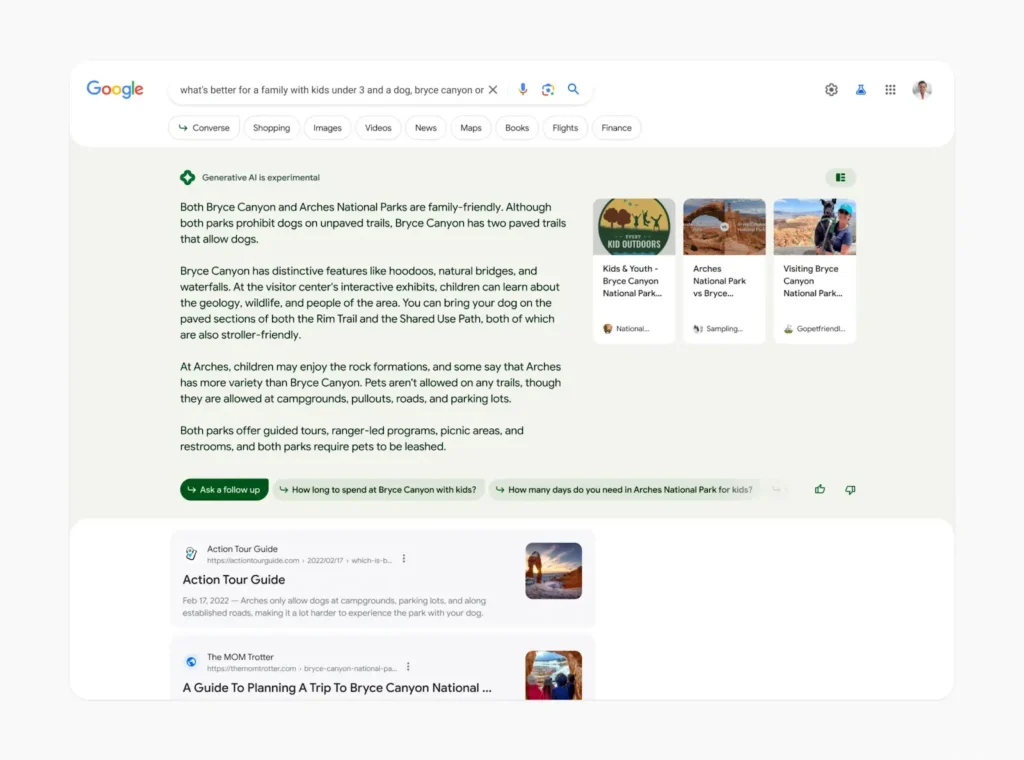Google’s AI Overview: A double-edged sword
Google recently announced a new AI-powered feature called “AI Overviews” that aims to provide users with concise summaries of online information on various topics when they search. While Google promotes this advancement in AI technology as a way to enhance the user experience, it could have significant implications for product review sites, both positive and negative.
Here’s how it works
The Google AI Overview is powered by large language models trained on vast amounts of data to understand and generate human-like text. When a user performs a search, Google’s systems analyze the query and determine if an AI-generated overview would be helpful.
If an overview is deemed relevant, the AI model generates a short summary that provides key information and insights related to the query. This overview is then displayed prominently in the search results. The AI model can synthesize information from multiple sources across the web to create an overview. It aims to capture the most pertinent details, key points, and perspectives concisely. Below is an example from SearchEngineLand for a search query about travel recommendations.

Why it matters to product review sites
Ranking well on Google for relevant product queries is a key driver of traffic and revenue for virtually every product review site. High-quality, in-depth review content that follows SEO best practices ranks prominently in Google’s regular web search results. Users click through these organic listings to read full reviews on the sites and when one of those users clicked on an affiliate product link and purchases the product, the site earns a commission from the merchant.
Established product review sites like CNET, Wirecutter, CNN Underscored, Reviewed.com and many more have become trusted brands that users seek out for reviews. Their domain authority often helps them appear at the top of the search results page. Smaller independent review sites covering niche product specs and use cases also rank highly for specific long-tail searches that drive targeted traffic.
Google’s AI Overviews have the potential to upend this status quo significantly. We spoke with Glen Allsopp, an industry expert on search and SEO and founder of Detailed.com, on the subject. While the AI Overviews feature is still brand new, Glen can foresee potential downsides for product review sites.
With such an important announcement, let’s review some potential positive and negative outcomes for product review sites.
The potential upside for product review sites
Increased Visibility and Traffic
One of the primary advantages of Google’s AI Overview feature for product review sites is the potential for increased visibility and traffic. When users search for information about a particular product, the AI-generated summary could include excerpts or links to relevant product reviews, driving more qualified site visitors. This increased exposure could translate into higher readership, engagement, and potentially, revenue.
Reduced Competition
The AI Overview will likely only cite and link to a few of the most authoritative and high-quality product review sources when summarizing information about a product or service. This means that instead of users having to sift through numerous review sites in the regular search results, the AI will essentially curate and highlight just the top few most reputable ones.
The potential downsides for product review sites
Reduced Direct Traffic
While increased visibility is a potential upside, there is also a risk of reduced direct traffic to product review sites. Suppose users find the AI-generated summaries sufficiently informative. In that case, they may be less inclined to click through to the original review sources and instead go directly to the retailer’s site, skipping the affiliate link altogether. This could negatively impact the review site’s revenue and overall engagement metrics.
Accuracy and Bias Concerns
As with any AI system, there are valid concerns about the accuracy and potential biases of the AI Overview feature. If the summaries misrepresent or oversimplify the nuances of product reviews, it could undermine the credibility and value of the original review content. Product review sites may need to be vigilant in monitoring the AI-generated summaries for errors or misrepresentations.
Potential disruption to business models
Depending on the implementation and adoption of the AI Overview feature, product review sites may need to adapt their business models and revenue streams. If users become accustomed to relying solely on the AI-generated summaries, it could disrupt the traditional model of driving traffic to individual review pages and monetizing through affiliate links.
There is no crystal ball in how this will all play out. Allsopp considers a scenario where AI Overviews could have a more limited affect, “The potential impact will certainly be lessened if Google doesn’t generate previews for this content type by default, or removes the ‘Generate’ button altogether. I’m not convinced people will want AI overviews in this space – at least not in their current iteration – so they might get skipped over habitually.”
As with any disruptive technology, Google’s AI Overview feature presents both opportunities and challenges for product review sites. While increased visibility and less competition are potential benefits, experts’ concerns about reduced direct traffic, accuracy, and disruption to business models cannot be ignored.
FAQ
Google’s AI Overview feature generates concise summaries of online information, providing key insights and pertinent details from various sources directly in the search results. This AI-powered tool aims to enhance the user experience by offering quick, comprehensive overviews that save time and improve information accessibility.
Google’s AI Overview can impact product review sites in multiple ways. can potentially to increase visibility and drive more qualified traffic by highlighting top-quality content. However, it also poses risks of reduced direct traffic if users find the AI summaries sufficient and bypass the original review sites, which could affect affiliate revenue and engagement metrics.
Product review sites can adapt to Google’s AI Overview by enhancing the depth and quality of their content, exploring new traffic sources, and partnering with influencers. Monitoring AI-generated summaries for accuracy and integrating with the AI Overview feature where possible can also help maintain relevance and optimize revenue streams.
How product review sites can adapt
Product review sites must continue to adapt and innovate by exploring new traffic sources, partnering with influencers, enhancing the depth and quality of their review content, or finding ways to integrate with the AI Overview feature. Ultimately, those who can strike the right balance between leveraging AI technology and preserving the value of their unique expertise and perspectives will be best positioned for long-term success.
Glen Allsopp provides the following thoughts for people as they navigate these new realities, “Everything is so new and fresh right now that honestly, my best advice is to just try and stay in the loop of what appears to be working, how prominent AI overviews are and who’s performing well. There’s going to be so much to unravel, so join some SEO newsletters (SEOFOMO, CoreUpdates, Ahrefs newsletter, etc.) to stay up to date.”
At impact.com, we believe publishers should be rewarded for their contribution to the buying journey. Our industry-leading tracking technology builds on that belief through multi-touch attribution, dynamic contracting, and seamless tracking across every digital environment.
Join impact.com’s Marketplace to enhance your visibility for brand partnerships.




